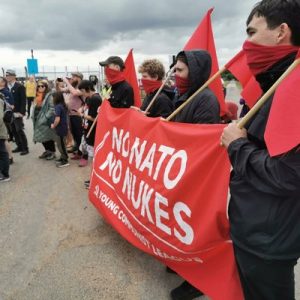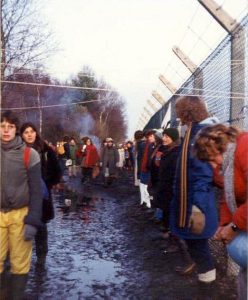Bird’s Eye View – CND / Wars
 ‘To be radical is to grasp things by the root’
‘To be radical is to grasp things by the root’
‘Hundreds gathered at RAF Lakenheath in Suffolk yesterday to reject the presence of US nuclear weapons in Britain after a report detailed Washington’s plans to deploy warheads across Europe. Protesters arrived from Bradford, Sheffield, Nottingham, Manchester and Merseyside with banners opposing Nato, raising them at the airbase’s perimeter fences. Veterans from previous struggles including Greenham Common stood alongside those attending an anti-nuclear demonstration for the first time’ (popularresistance.org, 22 May, bit.ly/3Nrbb0Q).
The Campaign for Nuclear Disarmament has failed. The UK is now no nearer to abandoning its nuclear weapons than it was when CND came into existence. The present government, as well as any which is likely to take power in the foreseeable future, Labour, Liberal or Tory, is firm on this. The women of Greenham Common did win sympathy from some workers attracted to the simple, emotional appeal of women who do not want to be destroyed in a holocaust, yet they failed to stop the first Cruise missiles, which were flown in right on schedule. The Lakenheath marchers, like their Aldermaston predecessors, have been travelling in exactly the wrong direction. Their propaganda has taken no account of the reasons for the existence of nuclear weapons. This has not necessarily been through ignorance of those reasons; perhaps some members of CND know them well enough, or did so once, e.g. the observation by two Greenham Common participants:
‘To oppose nuclear weapons requires a fundamental change in our attitude to life. Clarity of purpose and utter opposition is the only chance to reverse the threat that hangs over all our lives. What we want to change is immense. It’s not just getting rid of nuclear weapons, it’s getting rid of the whole structure that created the possibility of nuclear weapons in the first place. If we don’t use imagination nothing will change. Without change we will destroy the planet. It’s as simple as that’ (Boon, C., Social Movements and Political Power Emerging Forms of Radicalism in the West, Temple University Press, 1986, bit.ly/3a2S6Up).
Indeed. But such insight is all too rare: reformists always treat their problems in isolation from the rest of capitalism. Pacifists think of war as a problem on its own; charitable organisations consider poverty to be something like a personal accident. CND regards the Bomb as an evil which can be separated from its surroundings. And there are those who trumpet tribunals….
‘Workers of the world, unite!’
‘What has also become evident is the helplessness of peace-oriented approaches. Such voices are being shut out by mainstream media platforms, which is reinforced by the inability of the UN to act independently of a geopolitical consensus, and by inter-governmental impotence to safeguard human interest in face of the menacing moves by the most powerful states motivated by contradictory geopolitical motivations. In light of this line of interpretation, I am proposing the establishment of a civil society tribunal along the lines of the Russell Tribunal that brought independent critical voices to the fore on the Vietnam War in the midst of the Cold War in 1966-67. Although this experience was controversial at the time and of questionable relevance to ending that war…’ (Toward a People’s Ukraine Wars Tribunal, countercurrents.org, 7 May, bit.ly/3NCpcce).
The first Russell Tribunal was established to try America for war crimes in Vietnam (of which there was no shortage, of course) which really boiled down to support for the victory of that kindly, freedom-loving ’communist’, Uncle Ho. There have been five more ‘Russells’ to date. How many tribunals, peace groups and pow-wows have come and gone? Innumerable peace treaties, pious resolutions, prayers and demonstrations have been written, passed, uttered, forgotten and staged since the dawn of capitalism. Nuclear weapons remain, hypersonic missiles have made their destructive debut and both sides in the war between Russia and Ukraine continue to use cluster bombs, much to the consternation of Human Rights Watch which is urging both countries to stop and join the international treaty to ban their use. As W. M. Hughes, Prime Minister of Australia during the war to end all wars, observed:
‘The increasing intensity of competition for economic markets must lead to armed conflict unless an economic settlement is found. This, however, is hardly to be hoped for. Talk about peace in a world armed to the teeth is utterly futile’ (News Chronicle, 25 July 1936).
And today:
‘A senior U.S. State Department official said Thursday that a massive Ukraine aid package ― which contains $4 billion in grants for allies to buy American-made military hardware ― is partly aimed at eroding Russia’s share of the global defense market’ (US poised to bite into Russia’s global defense market share, yahoo.com, 13 May).
 We should remember that
We should remember that
‘The way things are organised is neither natural nor inevitable, but created by people. People have a wealth of skill, intelligence, creativity and wisdom. We could be devising ways of using and distributing the earth’s vast resources so that no one starves or lives in abject poverty, making socially useful things that people need — a society which is life-affirming in all its aspects’ (Alice Cook and Gwyn Kirk, Greenham Women Everywhere, South End Press, 1983).
What they say they want is also what socialists want; and when enough of us want it we will be able to combine those two remarkable human capacities, the emotional and the rational, in order to take things into our own hands and run our own society, our own world, in the interest of all people. Only then will ’peace and life’ be possible.
